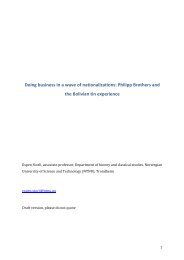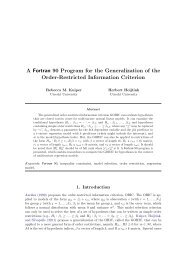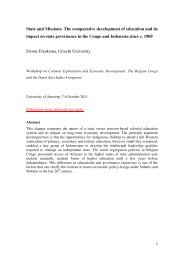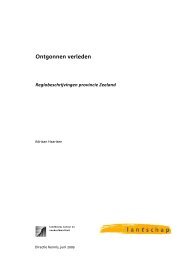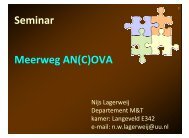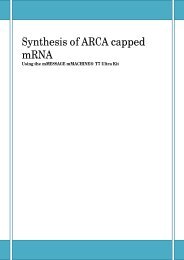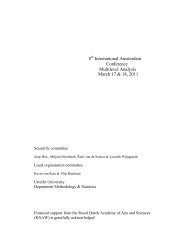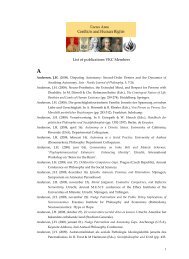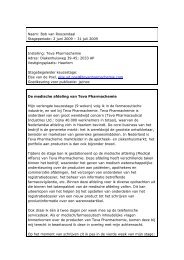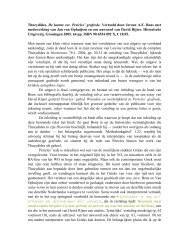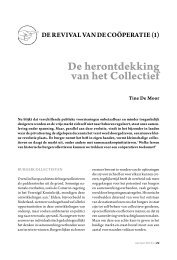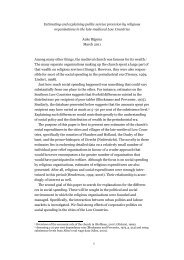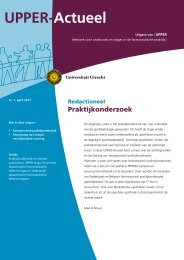New Approaches to Medieval Communication?1
New Approaches to Medieval Communication?1
New Approaches to Medieval Communication?1
You also want an ePaper? Increase the reach of your titles
YUMPU automatically turns print PDFs into web optimized ePapers that Google loves.
<strong>New</strong> <strong>Approaches</strong> <strong>to</strong> <strong>Medieval</strong> <strong>Communication</strong>?25his book, “Some psychodynamics of orality”, he outlines the differences betweenthinking in oral and literate societies 42 – and, as Goody and Watt, seesmajor adjustments <strong>to</strong> consciousness thanks <strong>to</strong> access <strong>to</strong> literacy. 43 Because ofthe debate about orality in anthropological circles, 44 medievalists, apart fromliterary his<strong>to</strong>rians who used it in a restricted sense, 45 have tended <strong>to</strong> avoid theuse of ‘orality’ for about a decade; 46 since 1990 the term has gradually becomeaccepted. 47 In general, though, the use of ‘orality’ remains restricted <strong>to</strong> certainforms of oral communication; and there is a tendency among medievalists not<strong>to</strong> speculate about orality’s possible implications for thought or the organizationof society.The German terminology for literacy and orality had a slightly differentdevelopment. The nearest equivalent <strong>to</strong> ‘literacy’ is ‘Schriftlichkeit’. In a posthumouspublication of Fritz Rörig, published in 1952, he distinguished between‘Schriftwesen’, the technical term for the conditions of the productionof the written word in document or book form, 48 and ‘Schriftlichkeit’, thedegree <strong>to</strong> which the written word was used in any period. If this degree is soextensive that the use of writing may be assumed for everyone, then ‘generalliteracy’ may be said <strong>to</strong> exist; if the use of writing in public and private life isabsent or virtually absent, then ‘illiteracy’ (‘Schriftlosigkeit’) may be said <strong>to</strong>exist. 49 The development of the meaning of ‘Schriftlichkeit’, influenced byAnglo-Saxon studies of literacy, 50 is parallel <strong>to</strong> the development of the meaningof ‘literacy’. In German, <strong>to</strong>o, adjectives have been developed, so that onehas, for instance conceptual, vernacular, and pragmatic literacy. 51 ‘Schriftkul-42 No. 129 (ONG, 1982), pp. 31-77.43 No. 129 (ONG, 1982), pp. 78-116.44 Nos. 61 (ONG, 1987), 70 (STREET, 1987), 48 (HENIGE, 1988), and especially Nos. 82(FINNEGAN, 1988) and 42 (FINNEGAN, 1990).45Nos. 1390 (VITZ, 1987), 46 (GREEN, 1990), 273 (GREEN, 1990), 174 (BEATON, 1990).Green, e.g. (No. 46) focuses on the implications of orality for the his<strong>to</strong>ry of reading (preparingNo. 896 (GREEN, 1994)).46An exception is No. 233 (GELLRICH, 1988).47See, e.g. Nos. 781 (MEWS, 1990), 290 (VANDERBILT, 1990), 286 (MILLER, 286), 718(MURRAY, 1994), 316 (STEVENSON, 1995) and 268 (INNES, 1998).48 See W. WATTENBACH, Das Schriftwesen im Mittelalter, 3rd edn. (Leipzig, 1896), dealingwith the production of written texts and its conditions.49No. 207, p. 29. ‘Illiteracy’ is also used in No. 31 (BÄUML, 1980), written by an AustrianbornGermanist, and in No. 415 (CAMILLE, 1984). ‘Illiteracy’ exclusively refers <strong>to</strong> absence of thewritten word; it should not be confused with ‘orality’.50 See, e.g. the literature referred <strong>to</strong> in No. 75, 24 (1990), pp. 390 ff.51 ‘Konzeptuelle S.’: No. 57 (OESTERREICHER, 1993); ‘volkssprachliche S.’: No. 421(CURSCHMANN, 1996); for ‘pragmatische Schriftlichkeit’, see infra, p. 26.



